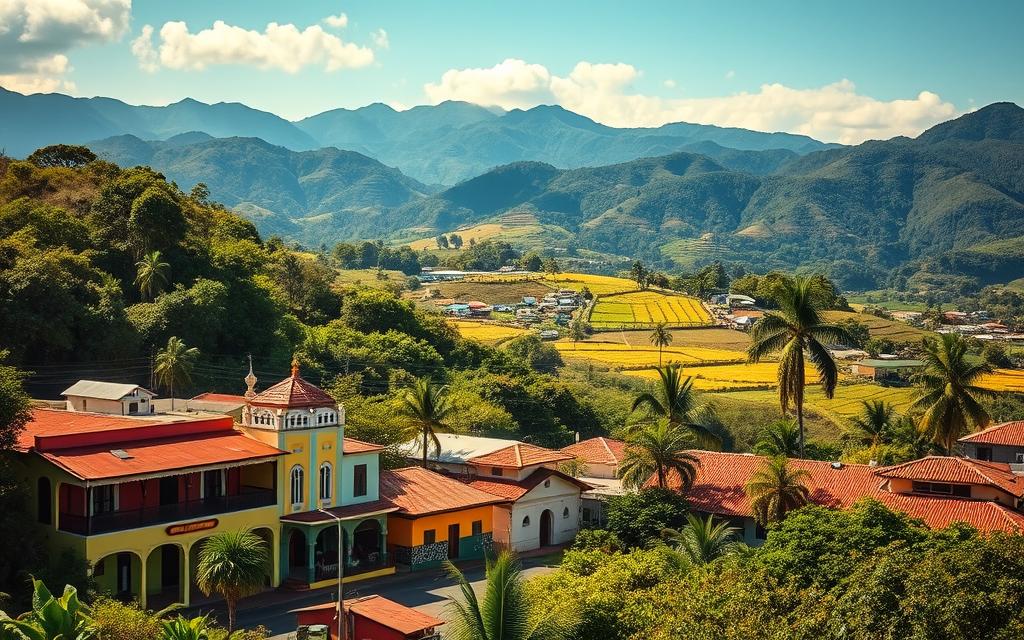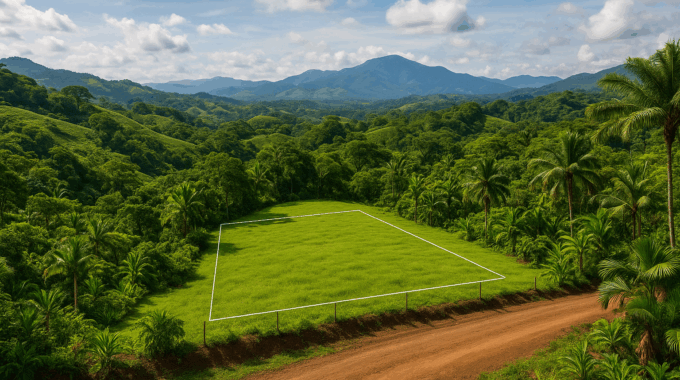"Property Renovations? Fund It With an Equity Loan from GAP Equity Loans. Borrow $50,000 to $1,000,000 with interest rates starting at 12% and flexible loan terms."

Due Diligence in Borrowing Money in Costa Rica Made Easy
Did you know that Costa Rica’s property market is attracting a growing number of foreign investors, with many seeking to secure financing through local lenders or private investors? As the demand for property investments in Costa Rica continues to rise, understanding the process of borrowing money against your property becomes increasingly important.
We simplify the process of securing financing for your property investments in Costa Rica. By connecting borrowers with private investors and lenders, we offer competitive rates, lower fees, and flexible financing options. Our goal is to help hardworking individuals achieve their investment property goals without unnecessary hurdles.
To ensure a smooth borrowing experience, it’s crucial to understand the essential aspects of due diligence when borrowing money against your property. This includes verifying the property’s legal status and confirming that it is free from any legal complications.
Understanding the Costa Rican Lending Landscape
The Costa Rican lending landscape is complex and differs significantly from what investors may be accustomed to in their home countries. Local financing for foreign buyers, which was once non-existent, is becoming more common as Costa Rican banks are finally starting to wake up to the potential of this market.
Costa Rica’s lending landscape is characterized by a mix of traditional banking and private lending options. Traditional banks often impose strict requirements and lengthy approval processes for foreigners, typically requiring extensive documentation and proof of income sources, and may have residency requirements that can be challenging for foreign investors to meet.

Traditional Banking vs. Private Lenders
Private lenders have emerged as a flexible alternative, offering more accessible qualification criteria and faster approval timelines for property-backed loans. They specialize in working with foreign property owners, understanding their unique needs and circumstances better than traditional financial institutions. While interest rates from private lenders may be higher than those of traditional banks, they come with significant advantages in terms of flexibility, speed, and accessibility.
For more information on comparing loan interest rates in Costa Rica, you can visit our guide to making informed decisions.
Home Equity Loans in Costa Rica
Home equity loans in Costa Rica allow property owners to leverage their real estate assets as collateral, unlocking capital without selling the property. The private lending market in Costa Rica has grown substantially in recent years, creating more competitive options for borrowers seeking alternatives to traditional banking. This growth has been driven by the increasing number of foreign investors in Costa Rican real estate.
Key Legal Considerations for Borrowers in Costa Rica
When borrowing money in Costa Rica, it’s crucial to understand the legal landscape that governs lending practices. This understanding is essential for navigating the complexities of securing a loan against property in Costa Rica.
Costa Rican Lending Laws and Regulations
Costa Rica has a specific set of lending laws and regulations that differ significantly from those in North America and Europe. These laws require careful attention to legal details when borrowing against property. For instance, the legal framework includes consumer protection provisions that regulate interest rates, fees, and loan terms to prevent predatory lending practices.
- Lending laws in Costa Rica are designed to protect both lenders and borrowers.
- Regulations govern the loan process, including the formalization of mortgage agreements.
- Understanding these laws is crucial for a smooth borrowing process.
Mortgages vs. Liens: Understanding the Difference
A critical aspect of borrowing against property in Costa Rica is understanding the distinction between mortgages and liens. A mortgage is a right over immovable property, such as land and buildings, while a lien is typically applied to movable assets like vehicles or animals. When using property as collateral, the loan is secured through a mortgage registered as an encumbrance on the property title.
Legal Documentation Required
The legal documentation required for property-backed loans in Costa Rica includes property title verification, identification documents, proof of income, and loan agreements drafted by a qualified notary. Costa Rican law requires that mortgage agreements be formalized through a notary public and registered with the National Registry to be legally enforceable.
Working with a qualified attorney who specializes in Costa Rican real estate and lending law is essential for navigating these legal complexities.
Essential Due Diligence in Borrowing Money in Costa Rica
To make informed financial decisions in Costa Rica, we must prioritize due diligence when borrowing money. Due diligence is the process of researching the physical and legal status of the property before making financial decisions. This process confirms that the property brings with it no legal complications and that you can do with it what you have planned.
Property Title Verification
Property title verification through Costa Rica’s National Registry is a critical first step to confirm legitimate ownership and identify any existing claims against the property. We must make sure that the property title is clear of any unexpected issues. This verification process helps prevent future legal complications and financial losses.
Lien and Encumbrance Checks
Lien and encumbrance checks are essential to reveal whether there are any outstanding debts, tax obligations, or legal claims that could affect the property’s value or our ability to use it as collateral. These checks are vital in ensuring that we are aware of any potential risks associated with the property.
Environmental Compliance Assessment
Environmental compliance assessment is particularly important in Costa Rica, where strict environmental laws may restrict development or use of certain properties, especially those near protected areas or water sources. We need to check whether the property is in a protected zone and whether this affects our plans. Properties in coastal zones are subject to Maritime Zone Law restrictions, which can significantly impact ownership rights and the property’s eligibility as loan collateral.
- Thorough due diligence is essential before using your Costa Rican property as loan collateral.
- Professional due diligence should include verification of property boundaries through survey checks.
- Checking for building code compliance and permit verification is essential if the property includes structures.
- Water and utility access verification is crucial in rural areas where these services may not be guaranteed.
By conducting thorough due diligence, we can mitigate potential risks and problems associated with borrowing money in Costa Rica. It’s recommended to work with specialized due diligence professionals who understand Costa Rica’s unique property laws and can identify potential issues that might not be obvious to foreign property owners or investors.
GAP Equity Loans: Using Your Property as Collateral

Using your Costa Rican property as collateral, you can secure a GAP Equity Loan, providing a viable financing solution for property owners in Costa Rica. GAP Equity Loans allow property owners to access substantial funding by leveraging their real estate assets.
GAP Equity Loans are particularly beneficial for property owners who need to access capital without selling their property or who may not qualify for traditional bank financing. These loans are determined based on the property’s appraised value.
Loan Amounts and Terms
GAP Equity Loans offer flexible terms ranging from 6 months to 3 years, with loan amounts between $50,000 and $1,000,000. The loan-to-value (LTV) ratios typically range from 50-70%, depending on the property type, location, and other risk factors.
Interest Rates and Fee Structure
Interest rates for GAP Equity Loans start at 12% and may increase based on the LTV ratio, property characteristics, and the borrower’s financial profile. The fee structure is straightforward, with transparent origination fees and no hidden charges.
The Application Process for Home Equity Loans
Our goal is to simplify the home equity loan application process in Costa Rica, making it easier for you to access the funds you need. At GAP Equity Loans, we guide you through each step, ensuring that all necessary documentation is properly prepared and submitted to prevent unnecessary delays.
Required Documentation
To initiate the application process for a home equity loan in Costa Rica, several key documents are required. These typically include property title documents, identification, proof of ownership, and tax payment receipts. For foreign applicants, additional documentation such as passport copies, proof of income from their home country, and sometimes references from Costa Rican residents may be necessary.
- Property title documents
- Identification and proof of ownership
- Tax payment receipts
- Passport copies (for foreign applicants)
- Proof of income from home country (for foreign applicants)
Property Valuation Process
The property valuation process is a critical component of the home equity loan application, as it determines the amount you can borrow. Professional appraisers assess the property’s market value, condition, location, and potential risks. This thorough evaluation ensures that the loan amount is aligned with the property’s value, making the process secure for both the lender and the borrower.

Timeline Expectations
For GAP Equity Loans, the timeline from application to funding is typically 2-4 weeks, significantly faster than the 2-3 months often required by traditional Costa Rican banks. The process includes preliminary approval based on initial property information, followed by formal due diligence, property appraisal, and final loan documentation. We work closely with a notary public to formalize the loan agreement and register the mortgage with the National Registry, securing the lender’s interest in the property. For more information on the due diligence process, visit our detailed guide on performing due diligence in Costa.
- Preliminary approval based on initial property information
- Formal due diligence and property appraisal
- Final loan documentation and funding
Managing Risks When Borrowing Against Costa Rican Property
When leveraging your Costa Rican property for a loan, it’s crucial to understand the associated risks. Borrowing against property in Costa Rica can be a viable financial strategy, but it involves unique challenges that require careful management and planning to protect your investment.
Currency Exchange Considerations
For foreign investors, currency exchange considerations are crucial when borrowing against Costa Rican property. Fluctuations between the U.S. dollar, Costa Rican colón, and other currencies can significantly affect loan costs and repayment amounts. We recommend securing loans in the same currency as your primary income source to minimize exchange rate risks. This strategy helps avoid unexpected increases in payment amounts, ensuring more stable financial planning. For more information on the due diligence process, you can visit our detailed guide on due diligence in Costa.
Protecting Your Investment
Protecting your investment in Costa Rican property involves several key considerations. One important aspect is title insurance, which, although less common in Costa Rica than in the U.S., provides valuable protection against undisclosed property defects or ownership disputes. Additionally, property insurance is essential when using real estate as collateral, protecting against natural disasters, fire, and other potential damages that could affect the property’s value. By taking these precautions, investors can better secure their investments and mitigate potential risks associated with borrowing against their property.
Working with Local Professionals
When navigating Costa Rica’s lending landscape, partnering with local experts is crucial for a smooth borrowing process. The unique legal and financial environment of Costa Rica demands specialized knowledge, making local professionals indispensable for property owners seeking loans.
Finding a Qualified Attorney
Finding a qualified attorney who specializes in Costa Rican real estate and lending law is a top priority. Your attorney will investigate the property’s title to ensure it’s free from any liens or encumbrances, a process facilitated by Costa Rica’s relatively transparent National Registry. Look for attorneys fluent in both Spanish and your native language to ensure clear communication and understanding of all legal documents and processes.
The Role of a Notary Public in the Loan Process
The role of a notary public in Costa Rica is more significant than in many other countries. Notaries are specialized attorneys with the exclusive authority to prepare and register mortgage documents. They serve as neutral third parties, verifying the identity of all parties, confirming the legality of transactions, and ensuring proper registration of documents with government authorities. This critical role makes them essential in the loan process.
Conclusion: Securing Your Financial Future in Costa Rica
With the right guidance and due diligence, property owners in Costa Rica can unlock the value of their investments. Throughout this guide, we’ve explored the essential components of responsible borrowing in Costa Rica, from understanding the lending landscape to working with qualified professionals who can safeguard your interests.
GAP Equity Loans offers a solution for property owners seeking to leverage their Costa Rican real estate investments to access capital with competitive terms and a streamlined process. By following the due diligence steps outlined in this guide, you can minimize risks and maximize the benefits of using your property as collateral for financial needs.
For more information on navigating the complexities of Costa Rican lending laws and regulations, you can visit our topics of interest page. Our team at GAP Equity Loans is committed to helping you navigate the borrowing process with transparency and professionalism, connecting you with investors who understand the value of Costa Rican real estate.
Whether you’re looking to expand your investment portfolio, fund renovations, or address other financial needs, using your Costa Rican property as collateral can provide the capital you need with terms that work for your situation. Contact us today via WhatsApp at +5064001-6413, call our USA/Canada line at 855-562-6427, or email [email protected] to discuss how we can help you leverage your property investment to secure your financial future in Costa Rica.
Article by Glenn Tellier (Founder of CRIE and Grupo Gap)



